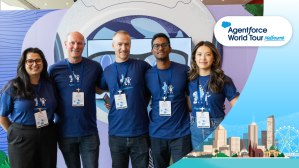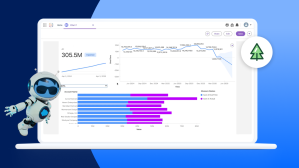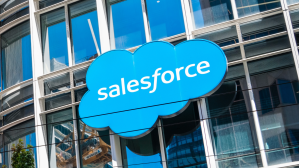Back when the world was prepping for Y2K, “The Matrix” had just debuted, and the dot-com boom was still booming, Parker Harris and Marc Benioff were standing in a parking lot outside of a steakhouse in Burlingame, California, about to transform how businesses connect with their customers forever.
“Marc had this idea of making CRM as easy as buying a book on Amazon,” Harris said. “He said, ‘Do you want to start a company?’ I said absolutely.”
Not long after, the pair — along with Harris’ partners at a software consultancy, Frank Dominguez and Dave Moellenhoff — founded Salesforce, setting up shop in a one-bedroom apartment in San Francisco’s Telegraph Hill neighborhood. They had a singular vision: to deliver an online customer relationship management (CRM) service that would help salespeople in businesses of all sizes track and manage leads.
Today, as the company celebrates its 25th anniversary, Salesforce remembers the moments and milestones from startup to high-tech giant — from building trust in the cloud to delivering artificial intelligence (AI) for CRM — and looks ahead to another quarter-century of innovation.
A vision guided by trust
From the beginning, Salesforce had an approach distinct from other tech companies of the time — first, by offering its product over the internet, also known as Software as a Service (SaaS) and the cloud.
It was a risky move. The cloud was largely unproven and few companies were willing to commit to this SaaS model. But Benioff, who became the company’s CEO, and his co-founders were committed to the potential of the cloud and knew if they could overcome security, privacy, and reliability concerns, they would pioneer a new industry model.
“When we started Salesforce, people still didn’t trust putting their credit cards on the internet, much less their customer lists,” said Harris.
Trust was one of the biggest obstacles to starting the company — getting companies to trust us with their data, that we would protect it, that we would honor it, and that it would be available when they needed it.
Parker Harris, Co-Founder Salesforce & CTO, Slack
Accomplishing that required more than a good elevator pitch, recalled Brian Millham, Salesforce’s 13th employee and current President and COO. It required transparency.
“The cloud was so new back then it wasn’t easy to convince people to put their data on the internet,” he said. “We were constantly educating and evangelizing, talking a lot about security and uptime in those days. We stood up a website called trust.com so everyone could see service availability, security, and performance.”
“We were very clear about the need to ensure that our customers could trust us with their data,” Millham said.
This was far from the prevailing wisdom of the time.
“A lot of companies, peers, and competitors were using their customer data for their own benefit,” said Amy Weaver, President and CFO at Salesforce. “It raised the question, ‘What should Salesforce do?’ Were we leaving opportunities on the table by not doing this?”
Salesforce took a different view. “We took a view that our customer’s data is their data — not our product — and we are going to respect that. Over time, I think that has paid off because customers know we’ve been true to our number one value: trust,” said Weaver.
Building an innovative platform
Of course, trust alone won’t get the job done. Salesforce knew it had to prove its concept that the internet could transform how businesses use data and it was obsessed with creating a new kind of CRM platform to deliver customer success.
“Customer success is our success and it’s really been a flywheel of growth for us,” Millham said. “The more you deliver for your customers, the more value they get from your technology, the more they want to invest with you. As they’ve needed more from us, we’ve been able to continuously innovate to meet our customers’ expectations.”
To meet those expectations, Salesforce had to solve two problems: build a platform that could be scaled for businesses of any size, anywhere, while also allowing them to customize the product to fit their unique needs.
“We needed to provide relevant service for every customer, and the big innovation there was the metadata platform,” Harris explained. “We invented this idea of the metadata platform where our customers could describe what they wanted — what kind of data model, what kind of user experience, what kind of business processes — and our code would interpret that metadata.”
The metadata platform abstracts away the complexity of application code, and enables Salesforce to upgrade customers with new capabilities automatically, three times a year, without breaking any of their integrations, customizations, or security settings.
“That is still really fundamentally one of the secrets to our success,” Harris said. “When somebody makes a change in metadata, it takes effect everywhere in the world, on every device, in every language. It’s instantaneous.”
With the metadata platform in place, Salesforce would expand from its first Sales Cloud product to a suite of apps helping professionals across service, marketing, commerce, and for every industry — all connected through its underlying metadata framework to create a 360-degree picture of a business’s customer.
“That’s almost magical for customers because it gives them the speed of making changes deployed in any region, in any language, in any device,” Harris said. “It moves at the speed of their business.”
CRM + AI + Data + Trust
Questions about putting business data in the cloud have long since been put to rest, but today they’ve been replaced by concerns over giving sensitive information to the next disruptive technology: AI.
Fortunately, the same lessons that helped Salesforce pioneer the SaaS model apply to ushering in the AI revolution. From the initial launch of Einstein in 2016, Salesforce’s approach to AI has been characterized by a focus on trust and customer obsession.
“We could have rushed into this generative AI world and provided solutions right out of the gate – we had the technology – but we took a step back and asked, ‘what are our customers concerned about?’” Millham said. “Trust was at the top of that list regarding generative AI.”
“It’s important to think about the way people use AI today,” Millham continued. “For so many businesses, their data is sitting trapped in silos of applications. We want it in Salesforce so that they can get access to all of it in one place. That means better insights to your customers, better productivity for your employees, augmenting the work that’s being done to drive higher efficiencies and better margins for your organization.”
The key to unlocking that data is Salesforce Data Cloud, a hyperscale data engine that harmonizes a company’s structured and unstructured data across every Salesforce app. Data Cloud allows every Salesforce app to communicate with each other through the metadata platform, which makes it possible to offer an AI that fully understands a business’s customer universe.
“Data Cloud brings it all together,” Benioff said. “With Salesforce Data Cloud, Salesforce can unlock this trapped data and bring together all of their business and customer data into one place for AI, all while keeping their data safe and secure.”
With Salesforce Data Cloud, Salesforce can unlock this trapped data and bring together all of their business and customer data into one place for AI, all while keeping their data safe and secure.
Marc Benioff, Chair, CEO & Co-Founder, Salesforce
Data Cloud is now a foundational piece of Salesforce’s Einstein 1 Platform, offering businesses the ability to safely connect customer information to build AI-powered apps with low code and deliver entirely new CRM experiences.
Salesforce is now bringing CRM, AI, data, and trust to life for customers with its new Einstein Copilot — a conversational AI assistant that utilizes an organization’s unique data to generate trusted customer insights and recommendations.
Grounded in a business’s own data across every Salesforce app, Einstein Copilot can answer questions, summarize content, create new content, interpret complex conversations, and dynamically automate tasks for users.
“Our new Einstein Copilot brings together an amazing intuitive interface for interacting with AI, world-class AI models, and above all, deep integration of the data and metadata needed to benefit from AI,” Benioff said. “Einstein Copilot is the only copilot with the ability to truly understand what is going on with your customer relationships.”
This integration ensures that every Salesforce user can get the full benefit of AI knowing the model is grounded in their unique data, delivering safe, secure, and relevant outputs.
“The reason Salesforce can provide the most trusted AI CRM is that we always operate by our values, trust being number one and customer success being number two — even ahead of innovation,” Harris said. “In this world of generative AI, if all you focus on is innovation, you’re going to get carried away with the magic of these large language models. But what’s more important than the magic of having it respond and put something in iambic pentameter like Shakespeare, is it responding in a trusted way.”
Harris continued: “Are we protecting our customers against that bias and that toxicity? And are we talking to our customers and watching how they’re using it? Are they successful with it? That is being guided by our values in action, and how we at Salesforce protect our customers and make sure that we’re leading the way into this world of AI with the power of trust.”
Building trust with all stakeholders
With AI proliferating across business and society, 68% of customers say it’s more important for companies to be trustworthy. But trust is about more than just data security. Being a trusted partner also means being a business that considers all stakeholders, not just customers.
Said Sabastian Niles, Salesforce’s newly appointed President and Chief Legal Officer: “Every decision we make at Salesforce is driven by our company core values and stakeholder success. As the AI and data revolution takes hold, infusing trust, responsibility, and impact in all we do is more important than ever to ensure the success of all our customers and stakeholders — and when they succeed, we succeed.”
Fortunately, that’s also part of Salesforce’s DNA.
Within months of its founding, Salesforce launched the 1-1-1 model, a new philanthropic model that dedicated 1% of the company’s equity, 1% of its product, and 1% of employees’ time back to the community.
That model has paid off. To date, Salesforce has given more than $700 million in grants, performed 9 million hours of volunteer service, 56,000 nonprofits and higher-ed customers use Salesforce software for free, and nearly 20,000 other companies have adopted the 1-1-1 model.
“In the early days of Salesforce, we had a really bold vision to create a new kind of a company, a new technology model, and a new philanthropy model,” said Suzanne DiBianca, Executive Vice President and Chief Impact Officer.
We wanted to do that from the start, not later, after we achieved a comfortable level of success.
Suzanne DiBianca, Chief Impact officer, Salesforce
And even as success came, Salesforce continued to find ways to use its technology and platform to support big societal challenges, like equal pay for equal work, access to education, and climate change.
Originally built to track and manage its own carbon footprint, Salesforce made Net Zero Cloud, an internal tool being used to track Salesforce’s sustainability efforts, available to other companies in 2017 to help them reduce their emissions. And in 2022, it officially added sustainability as a core value to accelerate its path to net-zero emissions.
“Everyone at Salesforce cares deeply about the work they do every day to drive innovation and technology and trying to make the world a better place,” Dibianca said. “We really truly believe that business can be the biggest platform for change, largely because it’s a collection of people with passion and intelligence that desire to do the right thing.”
For 25 years, Salesforce’s values — trust, customer success, innovation, equality, and sustainability — have guided every company decision and its mission to help companies connect with their customers in a whole new way.
“A company doesn’t get to almost 35 billion in revenue without focusing on outcomes that your customers need,” Milham said. “I’m excited to see where it’s going take us over the next 25 years.”
Go deeper:
- Find out how Trailhead helped one Trailblazer grow his nearly 20-year career as a Salesforce Administrator
- Read about Salesforce’s history of AI.
- Learn how Salesforce’s Data Cloud became the fastest growing organic innovation.





















